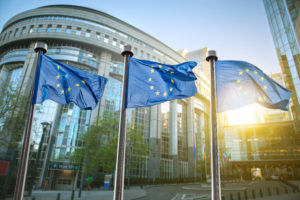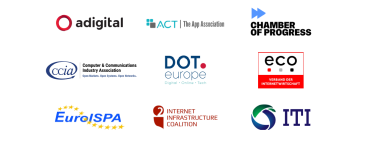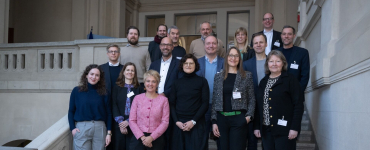Highlights from the Past Week
CW 5 / Monday, 30 January to Thursday, 2 February: Mini Plenary Sessions Week (Brussels);
INFRASTRUCTURE LEVY– LEAKED QUESTIONNAIRE: Last week, a draft of the EU Commission’s questionnaire (PDF) on issues surrounding the future of the connectivity sector became public. The questionnaire contains 60 questions and is divided into four sections:
- Technological and market developments: impacts on future networks and business
models for electronic communications - Fairness for consumers
- Barriers to the Single Market
- Fair contribution by all digital players
The publication and distribution of the questionnaire has already been postponed several times. Currently there is talk about 10 February – but even this date is not certain.
EIDAS – ENDORSEMENT AT HAND: MEPs have finalised their text for the eIDas Regulation, and it looks like they will pass it by 9 February, as foreseen by the rapporteur.
According to the latest information, the Parliament’s version would enhance privacy and “data minimisation” requirements: ID “wallets” will need to be able to generate pseudonyms and store data locally, in an encrypted fashion. The text also creates a new body, the European Digital Identity Framework Board, in charge of overseeing the implementation of the regulation and the wallet’s rollout. (see Politico Pro, paywall)
E-EVIDENCE – COMMITTEE ENDORSES TRILOGUE AGREEMENT: On Tuesday, the Civil Liberties Committee (LIBE) endorsed the agreement reached from negotiations with the Council of the EU on collecting and preserving electronic evidence (“e-evidence”) across Member State borders in the EU. The new legislation would allow national authorities to request evidence directly from service providers in other Member States, or ask that data be preserved for future use.
Both orders are to be issued only in the context of criminal proceedings. As such, they could only be requested for criminal offences punishable in the issuing country by a maximum term of imprisonment of at least three years, or for certain offences related to cybercrime, Child Sexual Abuse Material, counterfeiting of non-cash means of payment or terrorism.
The European Parliament plenary (13-16 February or 13-16 March) and the Council still have to decide on the final approval of the package, which consists of a regulation and a directive. Once it has been published in the EU’s Official Journal, it will enter into force 20 days later. Its provisions will apply after a transition period of 36 months. (see EP press release)
DIGITAL SERVICES ACT – COMMISSION PRESENTS GUIDANCE ON REPORTING DUTIES: The Digital Services Act (DSA) has given online platforms and online search engines the time until 17 February to publish the number of their active end-users. The Commission has now published non-binding guidance to help companies implement this obligation.
According to this guidance, users are considered “active” on platforms if they have “actually used the service at least once” in the previous six months. This use means that users are “exposed” to the content disseminated on the online interface or when they themselves provide content for display. As such, consumers as well as commercial users and traders are to be accounted for.
The concept of active users is not limited to registered users or only those who have carried out a transaction on an online platform. Depending on the design of the platform or search engine, content that is distributed there could also be exposed, regardless of whether the users are registered. With regard to online search engines, active users are those that have “actively submitted a query” in the past six months and are “exposed to the content indexed and presented on the provider’s online interface”.
The providers are also supposed to avoid double counting and “may” correct the figures accordingly if they “have the technical means to identify inauthentic users, such as bots or scrapers”.
ARTIFICIAL INTELLIGENCE – EP NEGOTIATIONS BY MARCH: In the last few weeks, the shadow rapporteurs met for the sixth time. Technical meetings No. 22 and 23 are already scheduled for Monday and Thursday.
A vote in the committee is currently not expected before March, nor in the plenary before April. So far, only Batch#1 (Art. 30-39) has been fully approved. (see Kai Zenner, Linkedin / Twitter)
Accordingly, the trilogue talks are likely to be concluded at the earliest under the Spanish Council Presidency.
This week’s agenda includes the discussion of Article 5 of the AI proposal and the question of which AI applications should be banned in principle. (Batch#11 – PDF)
AI LIABILITY – PARLIAMENT COMPETENCE TAKES SHAPE: The Conference of Committee Chairs of the European Parliament (CCC) has issued a recommendation (PDF) on which parliamentary committees should be responsible for the AI Liability Directive (AILD). The Legal Affairs Committee (JURI) had rejected the request of the Internal Market Committee (IMCO) and the Civil Liberties Committee (LIBE) – both of which are working on the AI Act that forms the basis for the AILD – for shared competence on some issues. The Conference of Committee Chairs supports the request of the superseded committees and is of the opinion that, while JURI remains the lead committee, IMCO and LIBE should have a say (sometimes jointly) on the first four articles of the AILD.
In particular, IMCO is to work with JURI on all issues related to an injured person’s rights under the Product Liability Directive and the liability and due diligence obligations of the Digital Services Act. JURI’s work, in turn, is to focus on non-contractual fault-based civil law claims for damages brought before national courts. The three committees must cooperate on disclosure of evidence in national courts and on several aspects where the Directive interacts with the AI Act.
The division of competences still has to be confirmed by the Conference of Presidents before work can begin. However, the rapporteur Axel Voss has already made it clear that this dossier will have to wait until the Parliament’s opinion on the AI Act. The EU Council has also put the AILD on hold while it continues to work on the Product Liability Directive.
COPYRIGHT – EXCHANGE ON ONLINE LIVE PIRACY: On 28 February, the Commission will hold a hearing with stakeholders to explain its upcoming proposal to combat online piracy of live content (Agenda – PDF). The discussion will address current practices regarding the take-down of content, dynamic injunctions and cooperation with and between public authorities. The initiative, in the form of a recommendation, is due to be presented on 26 April. (see Euractiv)
CYBER RESILIENCE – NEW PROPOSAL FROM STOCKHOLM: Last week, the Swedish Presidency distributed a new compromise proposal on the Cyber Resilience Act (PDF). In it, the EU Council expresses its preference to keep cybersecurity (largely) in control of Member States.
The proposal introduces a couple of changes, mostly on the requirements for products with digital elements (Article 5) and the obligations for manufacturers (Article 10). But interestingly, the document switches around the role of national Computer emergency response teams (CSIRTs) and the EU Agency for Cybersecurity (ENISA). The Presidency wants manufacturers to report any cyber-related events on their products within 24 hours to CSIRTs instead of ENISA. The response teams are then expected to notify ENISA and market surveillance authorities.
An additional point concerns the duration of security updates, which must be available for a minimum duration of 10 years. (see Politico Pro, paywall; Euractiv)
ONLINE POLITICAL ADVERTISING – EP CONFIRMS COMMITTEE POSITION: The plenary of the EU Parliament on Thursday confirmed the new rules on online political advertising, with the aim to “make elections and referenda more transparent and resistance to interference”.
In the finish-up, the result was far clearer than had been expected in advance: By 433 votes to 61, with 110 abstentions, the plenary voted in favour of the negotiating position proposed by the Single Market and Consumer Protection Committee. The plenary endorsement gives the go ahead to Parliament’s lead rapporteur, Sandro Gozi (Renew, FR), to begin talks with representatives of the Member States. The Council adopted its own position in December. (see EP press release)
PLATFORM WORKERS – PARLIAMENT READY FOR TRILOGUE TALKS: 376 MEPs voted in favour of the mandate for talks with Member States, 212 voted against and 15 abstained. Negotiations on the new law on platform workers can start once Member States decide on their own position.
The new rules would regulate how to correctly determine the employment status of platform workers and how digital labour platforms should use algorithms and artificial intelligence to monitor and evaluate workers. (see EP press release)
MEDIA FREEDOM – WORK IN THE CULTURE COMMITTEE TAKES OFF: After the presentation of the proposal for a Media Freedom Act in the Culture Committee on 23 January (video, 15:11), last week saw the hearing taking place there (video, 16:07; see EP press release).
While the Culture Committee was able to reach an agreement with the Internal Market Committee on the competence issue (shared competence), an agreement with the Civil Liberties Committee is expected next week.
It is also expected that S. Verheyen (EPP, DE) will take over the reporting. She is likely to be supported by P. Kammerevert (S&D, DE) and D. Riba (Greens, ES). G. Didier (EPP, FR) will draft the opinion in IMCO. (EP Legislative Observatory)
GERMANY – GAMBLING STATE TREATY UNSUITABLE FOR INTERNET BLOCKING: A blocking order issued by the Gemeinsamen Glücksspielbehörde (Joint Gambling Authority of the federal states) against the German Internet service provider 1&1, which was intended to prevent access to foreign illegal gambling content on the Internet, has been ruled to be unlawful. This has been decided by the Higher Administrative Court of Rhineland-Palatinate in interim legal protection (see press release OVG and LTO – DE).
Relevant Publications, including from the EP Think Tank:
- Regulating political advertising (At a Glance)
- Annual legislative planning in the EU (Briefing)
- A common charger for electronic devices: Revision of the Radio Equipment Directive (Briefing)
- EU secure connectivity programme 2023-2027: Building a multi-orbital satellite constellation (Briefing)
- Plenary round-up – February I 2023 (At a Glance)
- Opinion on the proposal for a regulation of the European Parliament and of the Council on harmonised rules on fair access to and use of data (Data Act) – Adam Bielan, IMCO – PDF
A Selection of the EU Commission’s Consultations
- New product priorities for Ecodesign for Sustainable Products – Call for evidence: 31 January 2023 to 25 April 2023
- Combating online piracy of live content – Call for evidence: 13 January to 10 February 2023
- VAT in the digital age – Feedback on the regulation: 8 December 2022 to 31 March 2023 (extended)
- Digital fairness – fitness check on EU consumer law – Consultation: 28 November 2022 to 20 February 2023
Outlook for the Current Week
You can find a list of the upcoming dates of the European Parliament here. The meeting calendar for 2023 is available here (PDF).
An overview of the most important dates of the Council week can be found here and the meeting calendar can be accessed here.
The official calendar as well as the programme of the Swedish Presidency can be found on the associated website.
Included among the Council dates are:
Summits and Ministerial Meetings:
- General Affairs Council, Monday, 6 February – Agenda, A Items, Background Brief;
- Special European Council, Thursday, 9 and Friday, 10 February;
Preparatory Bodies:
- Horizontal Working Party on Enhancing Resilience and Countering Hybrid Threats, Monday, 6 February;
- Working Group Judicial Cooperation in Criminal Matters (COPEN), Monday, 6 and Tuesday, 7 February;
- Working Party on Telecommunications and Information Society (incl. Internet Governance), Tuesday, 7 February;
- Working Party on General Affairs (incl. Online Political Advertising), Tuesday, 7 February;
- Audiovisual and Media Working Party (incl. EMFA), Wednesday, 8 February;
- Horizontal Working Party on Cyber Issues, Wednesday, 8 February;
- Working Party on Tax Questions (Indirect Taxation) (incl. VAT in the Digital Age Packet), Thursday, 9 February;
- COREPER I (incl. RED), Wednesday, 8 February;
- COREPER II, Wednesday, 8 February;
Information on the weekly Commission meeting can be found on the Commission’s website in the preview (PDF) or (at short notice) in the current agenda.
The following topic is on the agenda for the coming week:
- Union disaster resilience goals
You can find the judicial calendar of the ECJ here.
European Parliament Committees
CW 6 / Monday, 6 to Thursday, 9 February: Political Group and Committee Meetings Week (Brussels);
LIBE Committee (Civil Liberties)
Current Meetings
- Monday, 6February, 15.00-18.30 (Brussels)
Excerpt from the Draft Agenda
The current agenda does not contain any topics of direct relevance to the Internet industry.
Further Meetings (Calendar)
- Wednesday, 1 March, 9.00-12.30 and30-18.30 (Brussels)
- Thursday, 2 March, 9.00-12.30 and 14.30-17.30 (Brussels)
JURI Committee (Legal Affairs)
Current Meetings
- None
Further Meetings (Calendar)
- 27/28 February
Dossiers Timetable (2 February 2022)
ITRE Committee (Industry)
Current Meetings
- Monday, 6 February, 16.30-17.30 (with AFET, Brussels)
- Thursday, 9 February (Brussels)
Excerpt from the Draft Agenda
9 February 2023, 10.00 – 12.30
…
*** Electronic vote ***
*** Votes at approximately 10.00 in physical presence only ***
- Amending Regulation (EU) No 910/2014 as regards establishing a framework for a European Digital Identity
ITRE/9/06236
***I 2021/0136(COD) COM(2021)0281 – C9-0200/2021
| Rapporteur: | |||
| Romana Jerković (S&D) | PR – PE732.707v01-00 AM – PE734.285v01-00 AM – PE734.286v01-00 |
||
| Responsible: | |||
| ITRE* | |||
- Adoption of draft report
- Vote on the decision to enter into interinstitutional negotiations
- Deadline for tabling amendments:28 June 2022, 12.00
- Harmonised rules on fair access to and use of data (Data Act)
ITRE/9/08515
***I 2022/0047(COD) COM(2022)0068 – C9-0051/2022
| Rapporteur: | |||
| Pilar del Castillo Vera (PPE) | PR – PE732.704v01-00 AM – PE738.549v01-00 AM – PE738.511v01-00 AM – PE738.548v01-00 AM – PE738.509v01-00 |
||
| Responsible: | |||
| ITRE* | |||
- Adoption of draft report
- Deadline for tabling amendments:9 November 2022, 12.00
…
Further Meetings (Calendar)
- Thursday, 9 March (Brussels)
Dossiers Timetable (17 January 2023)
IMCO Committee (Internal Market)
Current Meetings
- Monday, 6 February, 15.00-18.30 (Brussels)
Excerpt from the Draft Agenda
…
- Implementation of the Audiovisual Media Services Directive
IMCO/9/08914
| Rapporteur for the opinion: | |||
| Marc Angel (S&D) | PA – PE734.307v01-00 AM – PE738.445v01-00 |
||
| Responsible: | |||
| CULT | Petra Kammerevert (S&D) | PR – PE738.565v02-00 AM – PE740.672v01-00 |
|
- Consideration of amendments
…
- Presentation of Policy Department study “Personalised Pricing”
…
Further Meetings (Calendar)
- Wednesday, 1 March, 9.00-30 and 14.30-18.30 (Brussels)
- Thursday, 2 March, 9.00-30 (Brussels)
Dossiers Timetable (January 2023)
CULT Committee (Culture)
Current Meetings
- Monday, 6 February, 15.00-18.30 (Brussels)
Excerpt from the Draft Agenda
6 February 2023, 15.00 – 18.30
…
- Presentation of the priorities of the Swedish Presidency
- Public hearing on the“European Media Freedom Act”
…
Further Meetings (Calendar)
- Wednesday, 1 / Thursday, 2 March (Brussels)
PEGA Committee (Pegasus Committee of Inquiry)
Current Meetings
- Thursday, 9 February 2023, 15.00-18.30 (Brussels)
Excerpt from the Draft Agenda
…
- Hearing on “Geopolitics of Spyware”
…
Further Meetings
- Thursday, 16 February, 9.00-12.00 (Strasbourg)
- Tuesday, 28 February, 10.00-12.30 (Brussels)
INGE2 Committee (Special Committee on Foreign Interference)
Current Meetings
- None
Further Meetings (Calendar)
- Tuesday, 28 February, 14.00-18.00 (Brussels)
Further Parliamentary Calendar Dates
- CW 7 / Monday, 13 to Thursday, 16 February: Plenary Sessions Week (Strasbourg);
- CW 8 / Monday, 20 to Friday, 24 February: Green Week (no meetings);
- CW 9 / Monday, 27 February to Thursday, 2 March: Committee Meetings Week;




